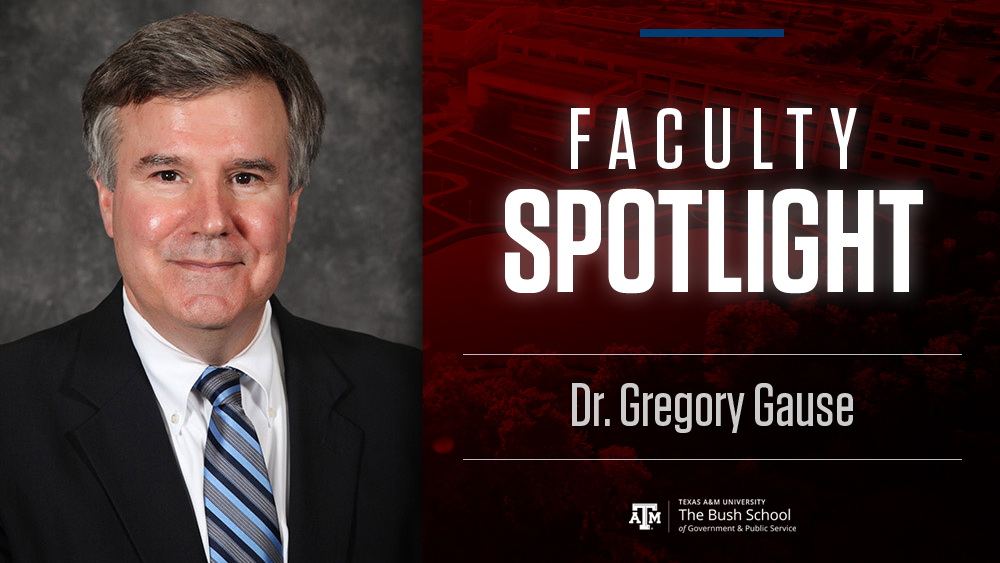
The career of Dr. Gregory Gause, III, head of the Department of International Affairs at the Bush School of Government and Public Service, has led him to pursue scholarly work in Kuwait, Saudi Arabia, and Cairo; conduct research for multiple prominent think tanks; and teach at several premiere universities. But while his career has been entirely in academia, Gause’s initial plan was a career in the Foreign Service.
“I never thought I’d go into academics,” said Gause. “I always thought I would have a government career. I took the Foreign Service exam; and as I was waiting for the results, I went into graduate school.”
Gause was in his second year of graduate school when he learned that, although he had progressed far into the process for the Foreign Service, his exam results likely were not high enough for a commission. Having done well in graduate school thus far, he continued his studies and received his PhD in political science at Harvard University.
After receiving his PhD, Gause again faced a decision: whether to pursue a career in government or academia. He chose the academic route and has since become a leading scholar on the international politics of the Middle East, with a particular interest in the Arabian Peninsula and the Persian Gulf. While firmly established in academia, Gause is still very mindful of practitioners in the field and how his research can contribute to a better understanding of issues facing the Middle East.
“I’ve been writing much more for policy audiences in the last decade or so of my career,” said Gause. “I like addressing those audiences—that was an incentive for coming to a policy school. I think you have to have that basis, that academic foundation, in order to be able to intelligently address policy audiences with insights they might not normally have.”
Gause has testified on Persian Gulf issues before the House Committee on International Relations and the Senate Foreign Relations Committee. His articles have appeared in Foreign Affairs, Foreign Policy, Security Studies, Middle East Journal, and The National Interest, as well as in other journals and edited volumes.
Gause says his interest in foreign affairs began early in his life.
“I grew up in the 70s during the time of the first oil crisis, and it was all tied up in fascinating political issues in the Middle East,” said Gause. “I saw this as something really important to the United States and that it had been understudied, and it would be really interesting to focus on that. And it hasn’t disappointed.”
That interest in political issues in the Middle East would eventually lead Gause to make several visits to the region. While in graduate school, he spent a year at American University in Cairo to study Arabic. During his career, he has made multiple return trips to the region, including an appointment as a Fulbright Scholar at the American University in Kuwait and as a research fellow at the King Faisal Center for Islamic Studies and Research in Riyadh, Saudi Arabia.
The importance of visiting a region and learning its language is something Gause tries to impress upon the students studying international affairs at the Bush School.
“Language work is how you mark yourself as serious,” said Gause. “It gives you so much more access in terms of talking to people and reading what comes out of an area. It’s really important for anyone who wants to claim a region or a country as their expertise to learn the language.”
Prior to joining the Bush School, Gause served as chair of the political science department at the University of Vermont, where he had also served as a professor and the director of the department’s Middle East studies program. Gause also taught at Columbia University for several years, in addition to spending a year as a visiting professor at the Kennedy School of Government at Harvard. His interest in teaching at the graduate level led him to join the Bush School as head of the department of international affairs in 2014.
“Particularly after 9/11 and the Iraq War, I wanted to teach students who were looking for a career in government and in the foreign policy establishment,” said Gause. “The Bush School is a place that’s growing, and being able to participate in that growth is exciting. At lots of universities, the first question that gets asked is ‘How can we cut?’ At Texas A&M and the Bush School, the first question that’s asked is ‘How can we grow?’ And that made taking an administrative position here an interesting prospect.”
When asked about his decision to become a university professor rather than pursuing the original plan of a government career, he says he has never regretted the decision.
“If I hadn’t received a very nice academic job for my first job, I might have ended up in government to see what kind of career I could get there,” said Gause. “But the accidents of your life history lead you places you didn’t think they would. I haven’t regretted it for a minute. I’ve been very happy with the choice.”
